Pepe Escobar interviews the Eurasia Economic Union’s Sergey Glazyev, a man in the eye of our current geopolitical and geo-economic hurricane.
 Sergey Glazyev is a man living right in the eye of our current geopolitical and geo-economic hurricane. One of the most influential economists in the world, a member of the Russian Academy of Sciences and a former adviser to the Kremlin from 2012 to 2019, for the past three years he has helmed Moscow’s uber strategic portfolio as minister in charge of integration and macroeconomics of the Eurasia Economic Union (EAEU).
Sergey Glazyev is a man living right in the eye of our current geopolitical and geo-economic hurricane. One of the most influential economists in the world, a member of the Russian Academy of Sciences and a former adviser to the Kremlin from 2012 to 2019, for the past three years he has helmed Moscow’s uber strategic portfolio as minister in charge of integration and macroeconomics of the Eurasia Economic Union (EAEU).
Glazyev’s recent intellectual production has been nothing short of transformative, epitomized by his essay “Sanctions and Sovereignty” and an extensive discussion of the new, emerging geo-economic paradigm in an interview with a Russian business magazine.
In another of his recent essays, Glazyev comments on how “I grew up in Zaporozhye, near which heavy fighting is now taking place in order to destroy the Ukrainian Nazis, who never existed in my small Motherland. I studied at a Ukrainian school and I know Ukrainian literature and language well, which from a scientific point of view is a dialect of Russian. I did not notice anything Russophobic in Ukrainian culture. In the 17 years of my life in Zaporozhye, I have never met a single Banderist.”
Glazyev was gracious to take some time from his packed schedule to provide detailed answers to a first series of questions in what we expect to become a running conversation, especially focused on the Global South. This is his first interview with a foreign publication since the start of Operation Z. Many thanks to Alexey Subottin for the Russian-English translation.
The Cradle: You are at the forefront of a game-changing geo-economic development: the design of a new monetary/financial system via an association between the EAEU [Eurasian Economic Union] and China, bypassing the U.S. dollar, with a draft soon to be concluded. Could you possibly advance some of the features of this system – which is certainly not a Bretton Woods III – but seems to be a clear alternative to the Washington consensus and very close to the necessities of the Global South?
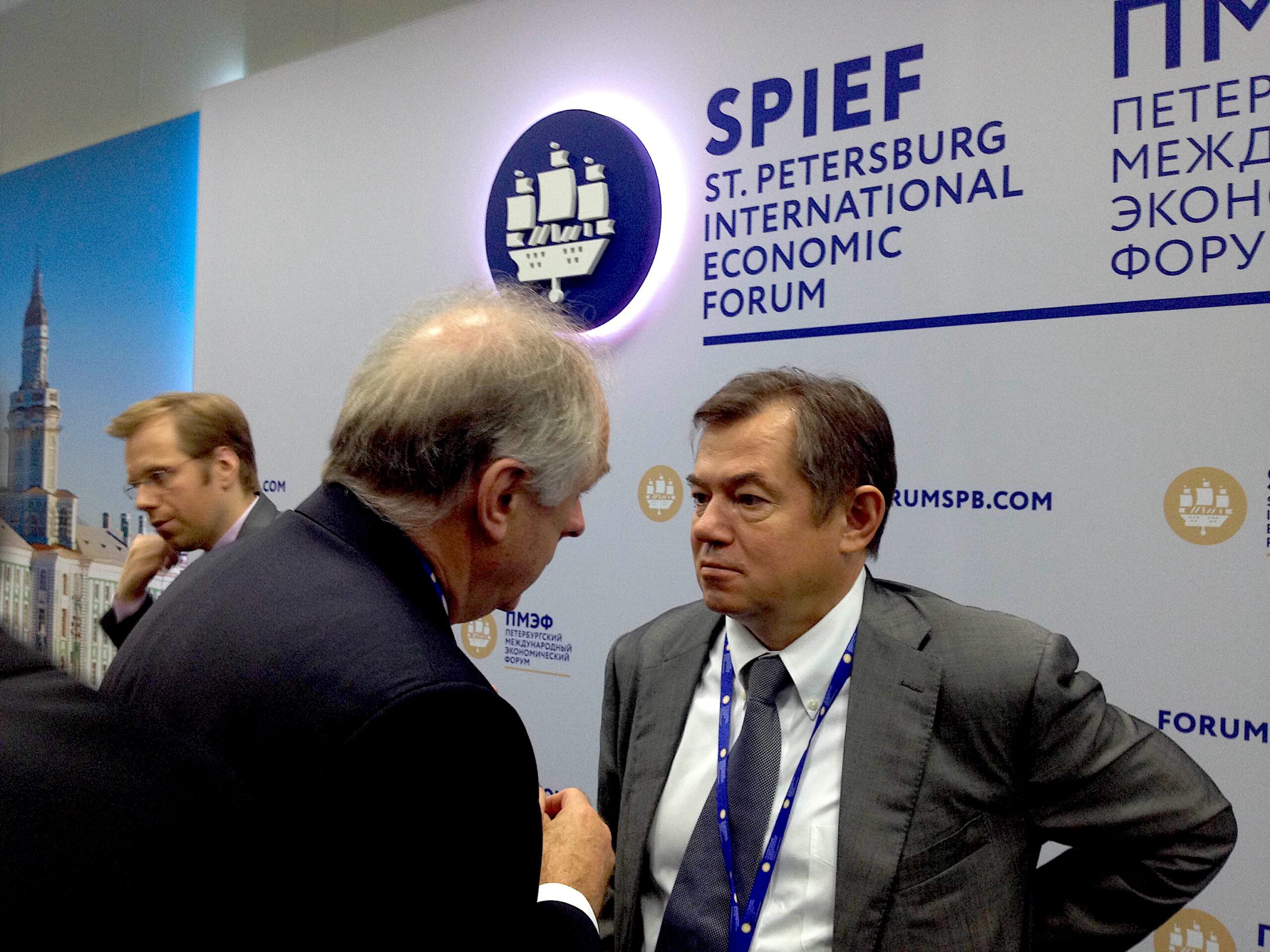
Sergey Glazyev, right, at an International Institute for Applied Systems conference in 2016. (IIASA, Flickr, CC BY-NC-SA 2.0)
Glazyev: In a bout of Russophobic hysteria, the ruling elite of the United States played its last “trump ace” in the hybrid war against Russia. Having “frozen” Russian foreign exchange reserves in custody accounts of Western central banks, financial regulators of the U.S., EU, and the U.K. undermined the status of the dollar, euro and pound as global reserve currencies. This step sharply accelerated the ongoing dismantling of the dollar-based economic world order.
Over a decade ago, my colleagues at the Astana Economic Forum and I proposed to transition to a new global economic system based on a new synthetic trading currency based on an index of currencies of participating countries. Later, we proposed to expand the underlying currency basket by adding around 20 exchange-traded commodities. A monetary unit based on such an expanded basket was mathematically modeled and demonstrated a high degree of resilience and stability.
At around the same time, we proposed to create a wide international coalition of resistance to the hybrid war for global dominance that the financial and power elite of the U.S. unleashed on the countries that remained outside of its control. My book The Last World War: the USA to Move and Lose, published in 2016, scientifically explained the nature of this coming war and argued for its inevitability — a conclusion based on objective laws of long-term economic development. Based on the same objective laws, the book argued the inevitability of the defeat of the old dominant power.
Currently, the U.S. is fighting to maintain its dominance, but just as Britain previously, which provoked two world wars but was unable to keep its empire and its central position in the world due to the obsolescence of its colonial economic system, it is destined to fail.
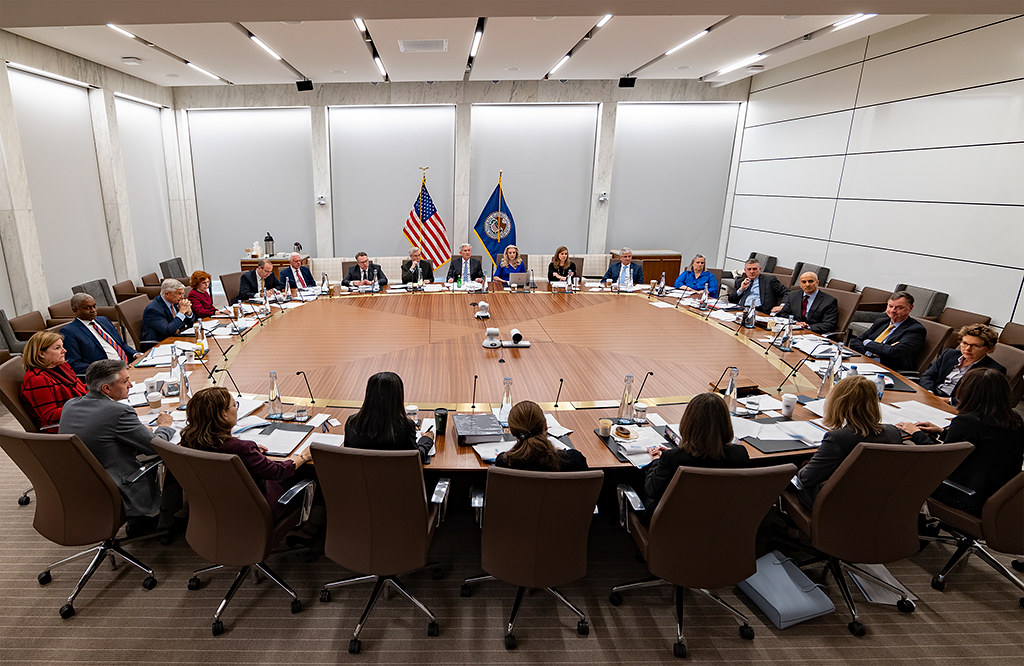
U.S. Federal Reserve’s Open Market Committee, or FOMC, meeting in Washington on March 16. Confidential documents in photo have been obscured. (Federal Reserve)
The British colonial economic system based on slave labor was overtaken by structurally more efficient economic systems of the U.S. and the U.S.S.R. Both the U.S. and the U.S.S.R. were more efficient at managing human capital in vertically integrated systems, which split the world into their zones of influence.
A transition to a new world economic order started after the disintegration of the U.S.S.R. This transition is now reaching its conclusion with the imminent disintegration of the dollar-based global economic system, which provided the foundation of the United States global dominance.
The new convergent economic system that emerged in the PRC (People’s Republic of China) and India is the next inevitable stage of development, combining the benefits of both centralized strategic planning and market economy, and of both state control of the monetary and physical infrastructure and entrepreneurship.
The new economic system united various strata of their societies around the goal of increasing common wellbeing in a way that is substantially stronger than the Anglo-Saxon and European alternatives. This is the main reason why Washington will not be able to win the global hybrid war that it started. This is also the main reason why the current dollar-centric global financial system will be superseded by a new one, based on a consensus of the countries who join the new world economic order.
In the first phase of the transition, these countries fall back on using their national currencies and clearing mechanisms, backed by bilateral currency swaps. At this point, price formation is still mostly driven by prices at various exchanges, denominated in dollars. This phase is almost over: after Russia’s reserves in dollars, euro, pound, and yen were “frozen,” it is unlikely that any sovereign country will continue accumulating reserves in these currencies. Their immediate replacement is national currencies and gold.
The second stage of the transition will involve new pricing mechanisms that do not reference the dollar. Price formation in national currencies involves substantial overheads, however, it will still be more attractive than pricing in “un-anchored” and treacherous currencies like dollars, pounds, euro, and yen. The only remaining global currency candidate – the yuan – won’t be taking their place due to its inconvertibility and the restricted external access to the Chinese capital markets. The use of gold as the price reference is constrained by the inconvenience of its use for payments.
The third and the final stage on the new economic order transition will involve a creation of a new digital payment currency founded through an international agreement based on principles of transparency, fairness, goodwill and efficiency.
I expect that the model of such a monetary unit that we developed will play its role at this stage. A currency like this can be issued by a pool of currency reserves of BRICS [Brazil, Russia, India and China] countries, which all interested countries will be able to join.
The weight of each currency in the basket could be proportional to the GDP of each country (based on purchasing power parity, for example), its share in international trade, as well as the population and territory size of participating countries.
In addition, the basket could contain an index of prices of main exchange-traded commodities: gold and other precious metals, key industrial metals, hydrocarbons, grains, sugar, as well as water and other natural resources.
To provide backing and to make the currency more resilient, relevant international resource reserves can be created in due course. This new currency would be used exclusively for cross-border payments and issued to the participating countries based on a pre-defined formula. Participating countries would instead use their national currencies for credit creation, in order to finance national investments and industry, as well as for sovereign wealth reserves. Capital account cross-border flows would remain governed by national currency regulations.
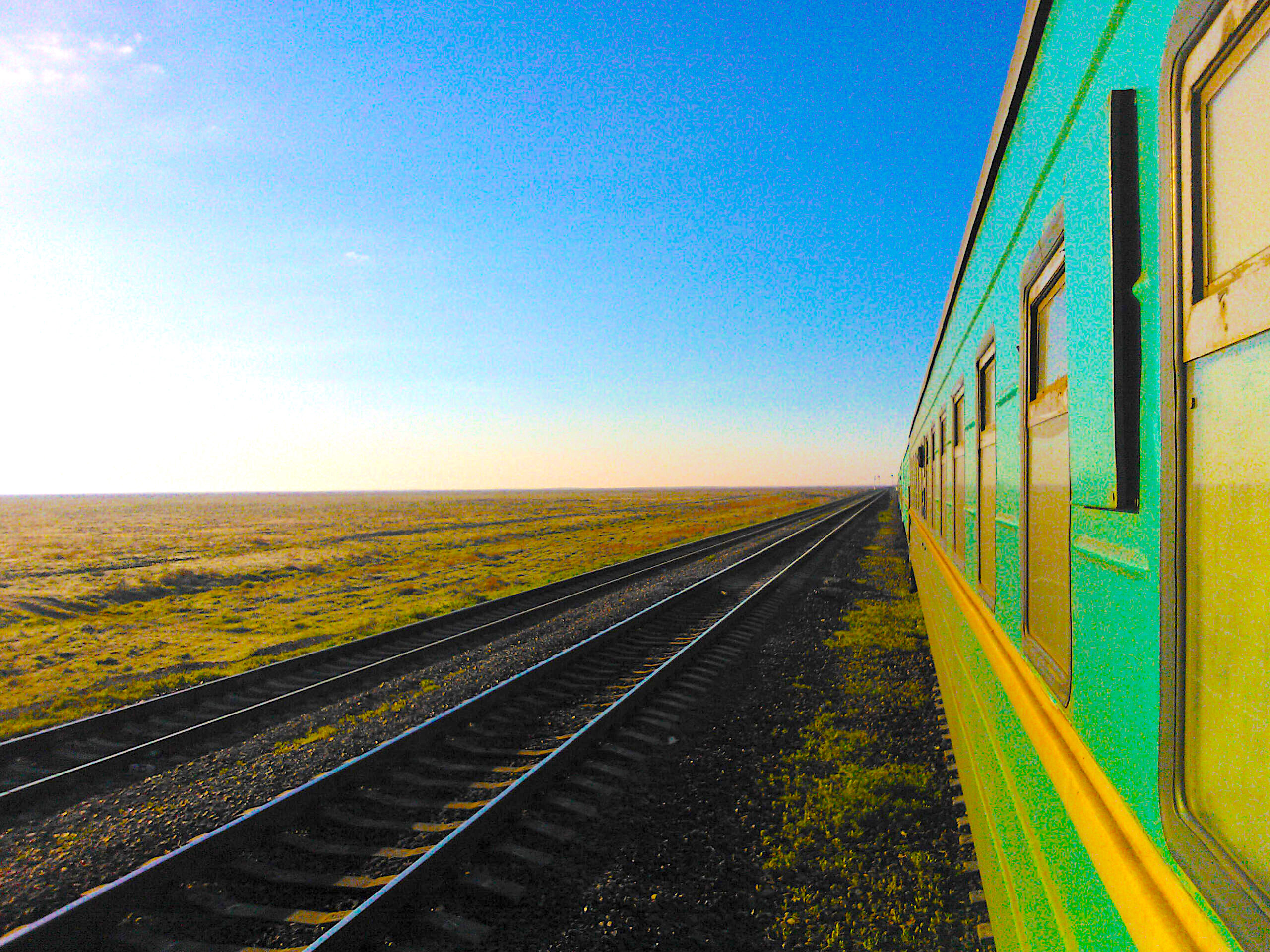
The Turkestan–Siberia Railway connecting Central Asian republics to Siberia. (Petar Milosevic, CC BY-SA 3.0, Wikimedia Commons)
The Cradle: Michael Hudson specifically asks that if this new system enables nations in the Global South to suspend dollarized debt and is based on the ability to pay (in foreign exchange), can these loans be tied to either raw materials or, for China, tangible equity ownership in the capital infrastructure financed by foreign non-dollar credit?
Glazyev: Transition to the new world economic order will likely be accompanied by systematic refusal to honor obligations in dollars, euro, pound and yen. In this respect, it will be no different from the example set by the countries issuing these currencies who thought it appropriate to steal foreign exchange reserves of Iraq, Iran, Venezuela, Afghanistan and Russia to the tune of trillions of dollars.
Since the U.S., Britain, EU and Japan refused to honor their obligations and confiscated the wealth of other nations which was held in their currencies, why should other countries be obliged to pay them back and to service their loans?
In any case, participation in the new economic system will not be constrained by the obligations in the old one. Countries of the Global South can be full participants of the new system regardless of their accumulated debts in dollars, euro, pound and yen.
Even if they were to default on their obligations in those currencies, this would have no bearing on their credit rating in the new financial system. Nationalization of extraction industry, likewise, would not cause a disruption. Further, should these countries reserve a portion of their natural resources for the backing of the new economic system, their respective weight in the currency basket of the new monetary unit would increase accordingly, providing that nation with larger currency reserves and credit capacity. In addition, bilateral swap lines with trading partner countries would provide them with adequate financing for co-investments and trade financing.
The Cradle: In one of your latest essays, “The Economics of the Russian Victory,” you call for “an accelerated formation of a new technological paradigm and the formation of institutions of a new world economic order.”
Among the recommendations, you specifically propose the creation of “a payment and settlement system in the national currencies of the EAEU member states” and the development and implementation of “an independent system of international settlements in the EAEU, SCO [Shanghai Cooperation Organisation] and BRICS, which could eliminate critical dependence of the U.S.-controlled SWIFT system.”
Is it possible to foresee a concerted joint drive by the EAEU and China to “sell” the new system to SCO members, other BRICS members, ASEAN members and nations in West Asia, Africa and Latin America? And will that result in a bipolar geo-economy – the West versus The Rest?
Glazyev: Indeed, this is the direction where we are headed. Disappointingly, monetary authorities of Russia are still a part of the Washington paradigm and play by the rules of the dollar-based system, even after Russian foreign exchange reserves were captured by the West.
On the other hand, the recent sanctions prompted extensive soul searching among the rest of the non-dollar-bloc countries. Western “agents of influence” still control central banks of most countries, forcing them to apply suicidal policies prescribed by the IMF. However, such policies at this point are so obviously contrary to the national interests of these non-western countries that their authorities are growing justifiably concerned about financial security.
You correctly highlight potentially central roles of China and Russia in the genesis of the new world economic order. Unfortunately, current leadership of the CBR (Central Bank of Russia) remains trapped inside the intellectual cul-de-sac of the Washington paradigm and is unable to become a founding partner in the creation of a new global economic and financial framework.
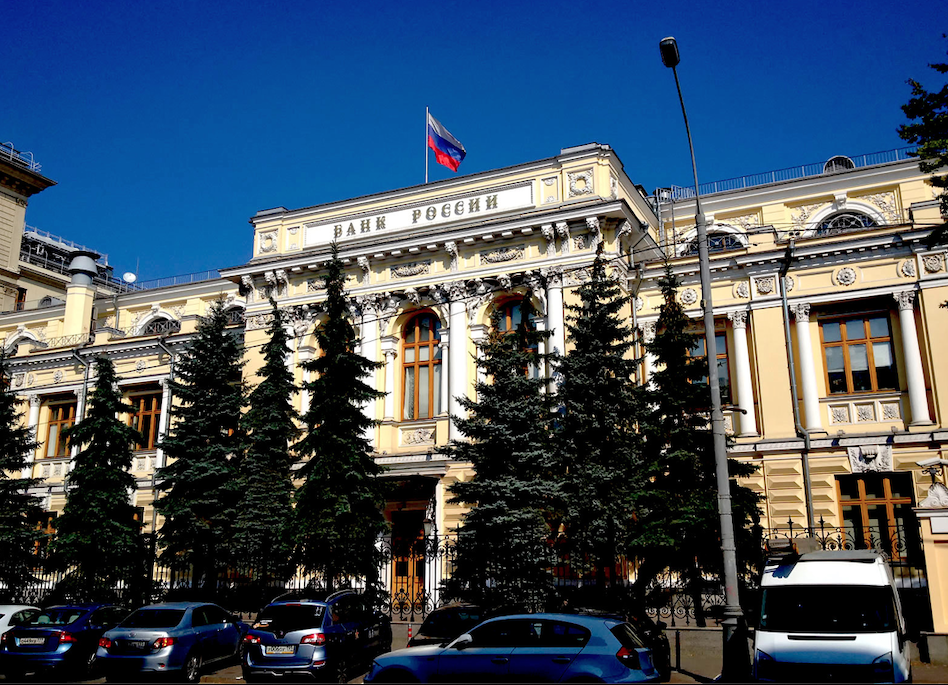
Central Bank of Russia in Moscow. (Moscow-Live, Flickr, CC BY-NC-SA 2.0)
At the same time, the CBR already had to face the reality and create a national system for interbank messaging which is not dependent on SWIFT and opened it up for foreign banks as well. Cross-currency swap lines have been already set up with key participating nations. Most transactions between member states of the EAEU are already denominated in national currencies and the share of their currencies in internal trade is growing at a rapid pace.
A similar transition is taking place in trade with China, Iran and Turkey. India indicated that it is ready to switch to payments in national currencies as well. A lot of effort is put in developing clearing mechanisms for national currency payments. In parallel, there is an ongoing effort to develop a digital non-banking payment system, which would be linked to gold and other exchange-traded commodities – the “stablecoins.”
Recent U.S. and European sanctions imposed on the banking channels have caused a rapid increase in these efforts. The group of countries working on the new financial system only needs to announce the completion of the framework and readiness of the new trade currency and the process of formation of the new world financial order will accelerate further from there. The best way to bring it about would be to announce it at the SCO or BRICS regular meetings. We are working on that.
The Cradle: This has been an absolutely key issue in discussions among independent analysts across the West. Was the Russian central bank advising Russian gold producers to sell their gold in the London market to get a higher price than the Russian government or central bank would pay? Was there no anticipation whatsoever that the coming alternative to the U.S. dollar will have to be based largely on gold? How would you characterize what happened? How much practical damage has this inflicted on the Russian economy short-term and mid-term?
Glazyev: The monetary policy of the CBR, implemented in line with the IMF recommendations, has been devastating for the Russian economy. Combined disasters of the “freezing” of circa $400 billion of foreign exchange reserves and over a trillion dollars siphoned from the economy by oligarchs into Western offshore destinations, came with the backdrop of equally disastrous policies of the CBR, which included excessively high real rates combined with a managed float of the exchange rate. We estimate this caused under-investment of circa 20 trillion rubles and under-production of circa 50 trillion rubles in goods.
Following Washington’s recommendations, the CBR stopped buying gold over the last two years, effectively forcing domestic gold miners to export full volumes of production, which added up to 500 tons of gold. These days the mistake and the harm it caused are very much obvious. Presently, the CBR resumed gold purchases, and, hopefully, will continue with sound policies in the interest of the national economy instead of “targeting inflation” for the benefit of international speculators, as had been the case during the last decade.
The Cradle: The Fed as well as the ECB were not consulted on the freeze of Russian foreign reserves. Word in New York and Frankfurt is that they would have opposed it had they been asked. Did you personally expect the freeze? And did the Russian leadership expect it?
Glazyev: My book, The Last World War, that I already mentioned, which was published as far back as 2015, argued that the likelihood of this happening eventually is very high. In this hybrid war, economic warfare and informational/cognitive warfare are key theaters of conflict. On both of these fronts, the U.S. and NATO countries have overwhelming superiority and I did not have any doubt that they would take full advantage of this in due course.
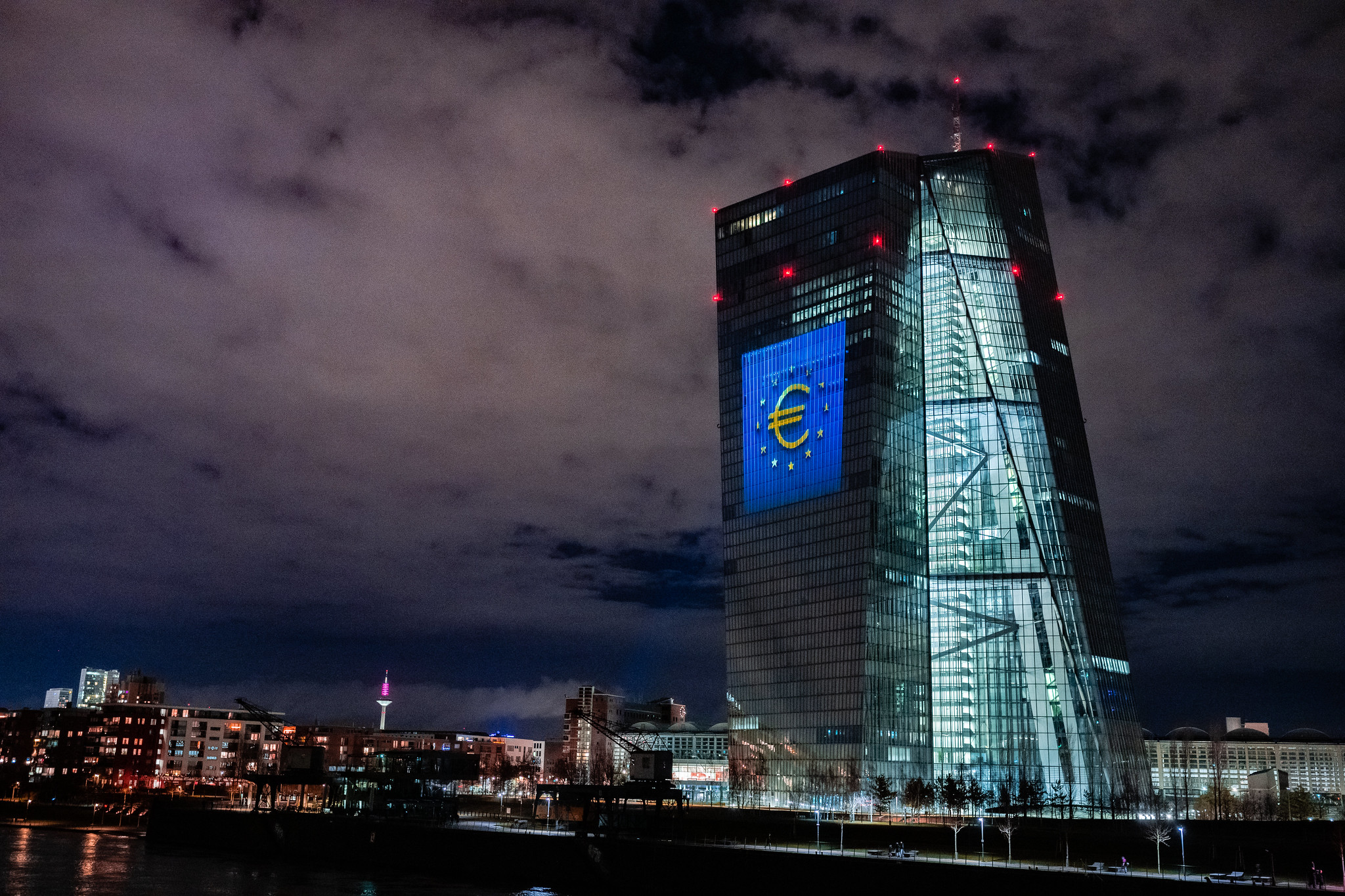
European Central Bank illuminated in December 2021 in anticipation of its 20th anniversary in 2022. (European Central Bank, Flickr, CC BY-NC-ND 2.0)
I have been arguing for a long time for the replacement of dollars, euro, pounds and yen in our foreign exchange reserves with gold, which is produced in abundance in Russia. Unfortunately, Western agents of influence who occupy key roles at central banks of most countries, as well as rating agencies and key publications, were successful in silencing my ideas. To give you an example, I have no doubt that high-ranking officials at the Fed and the ECB were involved in developing anti-Russian financial sanctions. These sanctions have been consistently escalating and are being implemented almost instantly, despite the well-known difficulties with bureaucratic decision making in the EU.
The Cradle: Elvira Nabiullina has been reconfirmed as the head of the Russian central bank. What would you do differently, compared to her previous actions? What is the main guiding principle involved in your different approaches?
Glazyev: The difference between our approaches is very simple. Her policies are an orthodox implementation of IMF recommendations and dogmas of the Washington paradigm, while my recommendations are based on the scientific method and empirical evidence accumulated over the last hundred years in leading countries.
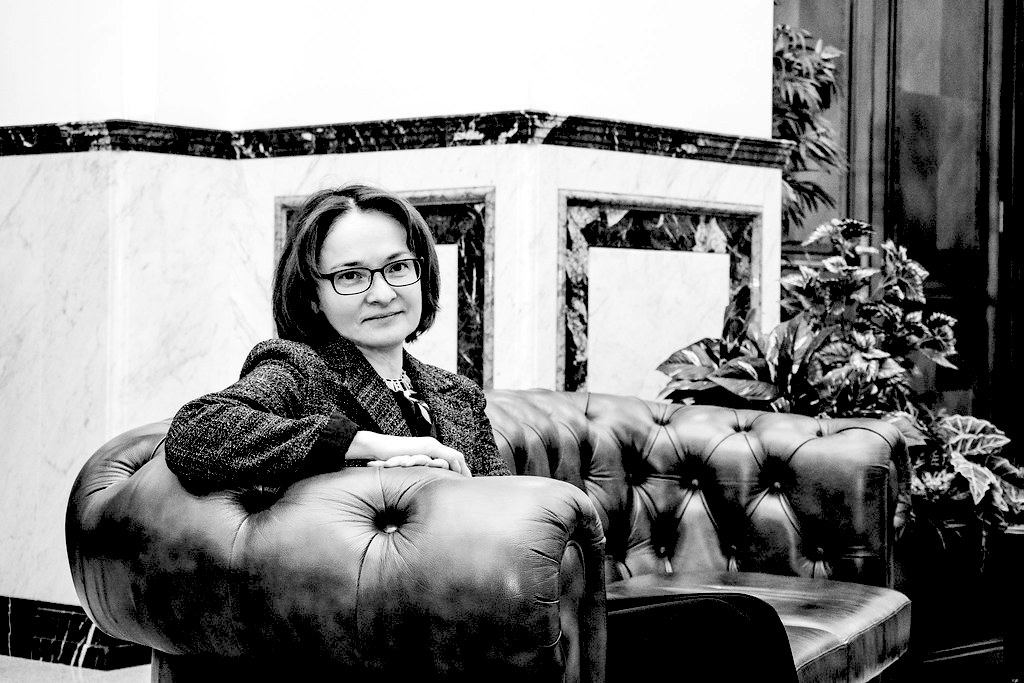
Elvira Nabiullina, chair of Russia’s central bank, in 2013. (Robert Yusupov, Flickr, (CC BY-NC-ND 2.0)
The Cradle: The Russia-China strategic partnership seems to be increasingly ironclad – as Presidents Vladimir Putin and Xi Jinping
themselves constantly reaffirm. But there are rumbles against it not only in the West but also in some Russian policy circles. In this extremely delicate historical juncture, how reliable is China as an all-season ally to Russia?
Glazyev: The foundation of Russian-Chinese strategic partnership is common sense, common interests and the experience of cooperation over hundreds of years. The U.S. ruling elite started a global hybrid war aimed at defending its hegemonic position in the world, targeting China as the key economic competitor and Russia as the key counter-balancing force. Initially, the U.S. geopolitical efforts were aiming to create a conflict between Russia and China. Agents of Western influence were amplifying xenophobic ideas in our media and blocking any attempts to transition to payments in national currencies. On the Chinese side, agents of Western influence were pushing the government to fall in line with the demands of the U.S. interests.
However, sovereign interests of Russia and China logically led to their growing strategic partnership and cooperation, in order to address common threats emanating from Washington.
The U.S. tariff war with China and financial sanctions war with Russia validated these concerns and demonstrated the clear and present danger our two countries are facing. Common interests of survival and resistance are uniting China and Russia, and our two countries are largely symbiotic economically. They complement and increase competitive advantages of each other. These common interests will persist over the long run.
The Chinese government and the Chinese people remember very well the role of the Soviet Union in the liberation of their country from the Japanese occupation and in the post-war industrialization of China. Our two countries have a strong historical foundation for strategic partnership and we are destined to cooperate closely in our common interests. I hope that the strategic partnership of Russia and the PRC, which is enhanced by the coupling of the One Belt One Road with the Eurasian Economic Union, will become the foundation of President Vladimir Putin’s project of the Greater Eurasian Partnership and the nucleus of the new world economic order.
Pepe Escobar is a columnist at The Cradle, editor-at-large at Asia Times and an independent geopolitical analyst focused on Eurasia. Since the mid-1980s he has lived and worked as a foreign correspondent in London, Paris, Milan, Los Angeles, Singapore and Bangkok. His latest book is Raging Twenties.
This article is from The Cradle.
The views expressed are solely those of the interviewee and may or may not reflect those of Consortium News.


When I listen to Hudson here making his case, as I am currently, the sounds of his words ring very true. All to familiar to be pushed aside and not given the due diligence and deep thought. The level of attention one would dedicate to their members of their own family.
What the Professor is telling is the story of the Deep State’s con on those of little power and influence. A con that both houses of congress are fully aware of and always have been.
How do I know? This is the easy part! Congress has defaulted on their responsibility to those they should be representing. Lobbyist having their own lawyers writing the text of bill they are lobbying for is proof. That should be the responsibility of congress. The use of overwhelming wealth held by corporations that are not people is key. The corps. use this wealth to derive undo influence in government. Something the average American could never achieve. Far too many congress members are lawyers for this not to have ever crossed their minds.
Our elected members of congress have abdicated their responsibility to us American humans and greedily grabbed the corporate tit.
Thanks CN
Anyone who wants a more in-depth understanding of the intentional economic plot behind the underlying unstoppable global crisis thundering towards us, and which the Ukraine/Russia imbroglio is but the opening salvo — yet only one more duplicitous pretext in ‘their’ literally deadly game, needs to see this recent, March 29th 2022 interview of the economist, Michael Hudson by Chris Hedges:
hxxps://www.youtube.com/watch?v=znXi6ksQtPc
EM: we checked that youtube site. It dates the interview as March 2020. In fact, that interview looks about 12-15 years old. We watch all interviews and articles by Hudson. His most recent interviews show him to be far older that what is portrayed there. Ditto with Chris Hedges.
If you want to read Hudson’s most recent articles, go to www (dot) michael-hudson (dot) com.
His most recent interviews can be seen on The Saker.
The time lapse since that old interview then and now is remarkably different because the issues of today with the US Hegemon, are very, very different.
Thanks for the heads -up’
I am quite familiar with Chris Hedges’ appearance, relating to the longitudinal aging process in all of us.
The interview I saw was definitely of recent date, March/April 2022, and most definitely not from 12 – 15 years ago.
The link I gave yesterday, which I immediately viewed worked as anticipated. It was that which I had just seen. However, today it is no longer available!
Goes to show! Chris Hedges is seen as a major threat to the powers that be, and that is the obvious reason why he has been arbitrarily “cancelled”
The reason I put up the link, in the first place, was specifically, “because the issues of today with the US Hegemon” therein, were in my analytical estimation, precisely “the issues of today”.
Yet, as pertains to that interview, when I tried just now to log in to the link I had submitted, and reviewed yesterday, it was no longer there.
So, in this respect you or the “we (who) checked that youtube site”, are correct.
But as far as the validity of the interviewer/interviewee conversation, I’ll go with their analyses as currently applicable.
If the U.S. hadn’t stollen Libya’s gold earmarked for an African-wide gold dinar, the entire world would be better off. Many observers believed this to be the central reason for the U.S./NATO destruction of the Libyan government. Thank you for this important article which you have continuously covered.
Agreed, once the initial reports came out there was nothing but silence. Seems pretty odd when the amount of gold was said to be around 60 tons. The theft is something that cold have been accomplished using 3 or 4 semi’s.
Strange indeed.
Hear! Hear! I always wondered after the destruction of Libya where Libya’s gold went. It certainly did not stay in Tripoli.
Maybe an airport someplace in the deep south or maybe in the middle east !~)
Thanks CN
I found both the first was #-21-2016 the second I’m guessing is a replay, Hudson is wearing the same burgundy sweater vest with dark blue, blue jean shirt.
Rubicon is correct about finding Hudson’s stuff on The Saker.
I would take some issue with Rubicon’s response regarding the time lapse. I’ve followed Hudson some as with Chris, they produce quite a significant amount of material, I don’t claim to have read all of either.
A finer point on Rubicons time lapse statement is six years later Hudson’s explanation seems easier to identify with. Which might have something to do with the recent vertical jump in inflation. No disrespect intended toward good samaritan Rubicon.
Thanks CN
If I didn’t make a critical mistake I wouldn’t be me. The date should read 3-21-2016.
FYI I’m still finding these vids on utbe. Some searching is necessary.
Thanks CN
The world seems very ripe for major and lasting change, and Glazyev may very well turn out to be the architect for a future system.
Just a small comment on Glazyev’s comments on his youth in Zaporozhye, Ukraine. I made several business trips to Kiev in 1996 and 1997 where I met with many representatives of industry, startups and academia. I also made several business trips to Russia in the same period and I think I still have a shoebox full of business cards from that era. They all spoke fondly of the close and friendly contacts between Russia, Ukraine and Belarus – in business, friendships and family bonds.
I asked many in Kiev at that time if they for the future would like to see closer contacts with Russia or EU, or both. They all – except two – answered firmly “Russia is our friend”. I still find it hard to believe those bonds built over centuries has vanished, even given recent events.
The first dissenter – a young woman at an Internet startup – said “Well, – maybe. It’s nice to be able to travel more, and it would be useful to have improved trade opportunities with the EU – but I still think Russia is our friend.
The second dissenter – a tall man in his 40’s – instantly turned quite upset, even angry with me and answered, even shouted “Well, there are some (that wants closer bonds with the EU rather than Russia), and if Europe wants them, they can have them!” I figured out that he was referring to the neo-nazi groups in western Ukraine – in the former Galizia. I have Polish roots, originating from south-eastern Poland where the followers of Bandera and his ilk tortured and killed many, including in my family – so I can understand how he felt about that.
Esse novo sistema dá uma esperança que o mundo pode se tornar melhor!!!
Não consigo entender o porquê do Banco Central Russo funcionar dessa forma que prejudica tanto a economia russa.
All that matters is… will Russia stop US/NATO from violently taking over countries with resources who nationalised them or countries that close off their economies to the West? China has stated it will only protect their own territory.
This “new system” will only happen over ultimate violent struggle not passively as the article implies.
I read this rather differently. The dollar/euro/pound/yen drivers with the USA as the dictator in charge are going down in a more massive, violent, kicking and screaming, modality against their hegemony than many could even imagined possible. Sanctions and monetary grabs, another nail in the dollar-trade coffin with every new move. Meanwhile, sane minds, such as represented by Mr. Glazyev, work logistically to come up with a far more egalitarian system that virtually every other country in the world can only be the better for using. Neither side is passive by any means, and I certainly wish the new planner godspeed in finding alternatives to SWIFT and dollar-trade.
Very pertinent insights. What is the US led coalition offering instead..? While a principle-free US and EU are frantically arming neo-Nazis in Ukraine to wage proxy wars, it seems that Russia, China and the Global South are busy changing the world from the bottom up to be sustainable and cooperative. In stark contrast, the US, leading its Western vassal states, consistently embraces the neocon paradigm. It is a vacuous paradigm founded on ideological stupidity which naturally and inevitably produces stupid outcomes; natural law: “Stupid in, Stupid out (SISO).” How could any nation embrace such a vacuous ideology and hope to prosper, and who will it take with it?
Thank you Sergey Glazyev, Pepe Escobar and Michael Hudson.
It’s such transformation to strike awe in our humility.
My selfish side is sorry that I may not see all of the fruits.
Excited for hope and change like never before.
A collection of facts about the history of our current war profiteer-based system is at War Profiteer Story.
hXXps://war**profiteer**story.blogspot.com
(Remove asterisks to use link, in addition to replacing XX with tt.)
This economic system has the old economic powers, especially the US and the UK, terrified. It would be perfect for Colombia and for the countries of our continents (Central and South America), seemingly designed with us in mind. And that I say although for me, personally, it would prove very disadvantageous, my income being in dollars. We in Colombia cannot continue as despised little brothers if we are to realize our potential domestically and internationally.
Muito relevante os dados apresentados por Pepe, como sempre uma reflexão a ser levada em conta, que a grande mídia dominada pelo “império”….jamais publicará.
Wow. Whether one agrees with Glazyev’s opinions or not, he seems like a voice of reason.
It’s too bad, because if the U.S. government had behaved themselves a little better we could have putzed along with reserve currency status for years. Now, the trigger-happy warmongers in D.C. have shot themselves in the foot, and sold us down the river.
I’d like to see them institutionalized, heavily medicated to where their chins are hanging on their chests so they could no longer speak, and thus ceasing to cause all of this mischief.
It’s been painful for years to watch Nabiullina hamstring the Russian economy. Glazyev sums up in a few sentences the wrongheadedness of what she has been doing. The fact that she has been reappointed to the Central Bank is stupefyingly dumb. Yes, I know her power has been curtailed to some extent, etc., etc. It still sends a message of ‘we are so stupid, we still don’t get it’.
Good to see Pepe back. Change is hard. Even if you’re getting screwed and desperately need the change.
I have often wondered why the Russian government does not realign the interests of the Russian Central Bank with the interests of the Russian people. Does anyone know what the barriers are to doing that?
The time has come to change the exploitative system. Sell outs in most of the countries, who are in charge of the monetary policies, need to be replaced though.
Absolute economic bomb article from Pepe Escobar, the vital link to ‘the great reset’ of the global elite, basically global fascism, the world control of the US via the IMF, the co-opting of China, the IMF control of Russia (the still very active economic remnants of US solution to 90’s Soviet economic collapse) and the economic flowering of the China/Russia break with the west, away from that ‘great reset’ to a regulated but human economic future.
Pepe needs a ‘follow up’ on the details of that ‘flowering’ human economic future as opposed to the trans-human great reset – a vital piece thankyou Pepe.